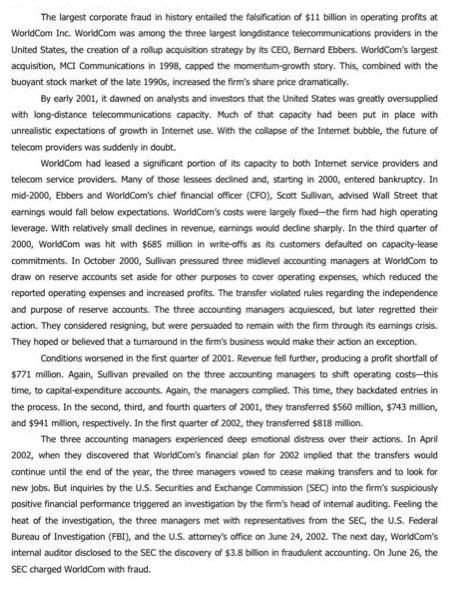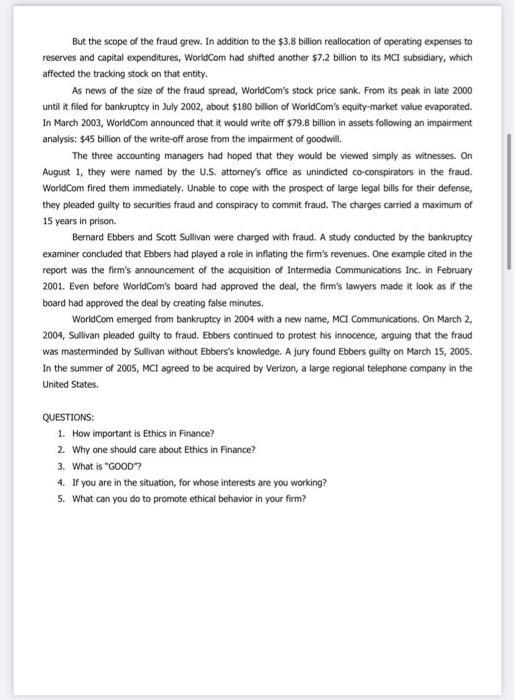Answered step by step
Verified Expert Solution
Question
1 Approved Answer
The largest corporate fraud in history entailed the falsification of $11 billion in operating profits at WorldCom Inc. WoridCom was among the three largest


The largest corporate fraud in history entailed the falsification of $11 billion in operating profits at WorldCom Inc. WoridCom was among the three largest longdistance telecommunications providers in the United States, the creation of a rollup acquisition strategy by its CEO, Bernard Ebbers. WorldCom's largest acquisition, MCI Communications in 1998, capped the momentum-growth story. This, combined with the buoyant stock market of the late 1990s, increased the firm's share price dramatically. By early 2001, it dawned on analysts and investors that the United States was greatly oversupplied with long-distance telecommunications capacity. Much of that capacity had been put in place with unrealistic expectations of growth in Internet use. With the collapse of the Internet bubble, the future of telecom providers was suddenly in doubt. WorldCom had leased a significant portion of its capacity to both Internet service providers and telecom service providers. Many of those lessees decined and, starting in 2000, entered bankruptcy. In mid-2000, Ebbers and WorldCom's chief financial officer (CFO), Scott Sulivan, advised Wall Street that earnings would fall below expectations. WorldCom's costs were largely fixed-the firm had high operating leverage. With relatively small declines in revenue, eamings would decline sharply. In the third quarter of 2000, WorldCom was hit with $685 million in write-offs as its customers defaulted on capacity-lease commitments. In October 2000, Sullivan pressured three midievel accounting managers at WorldCom to draw on reserve accounts set aside for other purposes to cover operating expenses, which reduced the reported operating expenses and increased profits. The transfer violated ruies regarding the independence and purpose of reserve accounts. The three accounting managers acquiesced, but later regretted their action. They considered resigning, but were persuaded to remain with the firm through its earnings crisis. They hoped or believed that a turnaround in the firm's business would make their action an exception. Conditions worsened in the first quarter of 2001. Revenue fell further, producing a profit shortfall of $771 million. Again, Sullivan prevailed on the three accounting managers to shift operating costs-this time, to capital-expenditure accounts. Again, the managers complied. This time, they backdated entries in the process. In the second, third, and fourth quarters of 2001, they transferred $560 million, $743 million, and $941 milion, respectively. In the first quarter of 2002, they transferred $818 millon. The three accounting managers experienced deep emotional distress over their actions. In April 2002, when they discovered that WorldCom's financial plan for 2002 implied that the transfers would continue until the end of the year, the three managers vowed to cease making transfers and to look for new jobs. But inquiries by the U.S. Securities and Exchange Commission (SEC) into the firm's suspiciously positive financial performance triggered an investigation by the firm's head of intemal auditing. Feeling the heat of the investigation, the three managers met with representatives from the SEC, the U.S. Federal Bureau of Investigation (FBI), and the U.S. attorney's office on June 24, 2002. The next day, WorldCom's internal auditor disclosed to the SEC the discovery of $3.8 bilon in fraudulent accounting. On June 26, the SEC charged WorldCom with fraud. But the scope of the fraud grew. In addition to the $3.8 billion reallocation of operating expenses to reserves and capital expenditures, WorldCom had shifted another $7.2 billion to its MCI subsidiary, which affected the tracking stock on that entity. As news of the size of the fraud spread, WorldCom's stock price sank. From its peak in late 2000 until it filed for bankruptcy in July 2002, about $180 billion of WorldCom's equity-market value evaporated. In March 2003, WorldCom announced that it would write off $79.8 billion in assets following an impairment analysis: $45 billion of the write-off arose from the impairment of goodwill. The three accounting managers had hoped that they would be viewed simply as witnesses. On August 1, they were named by the U.S. attorney's office as unindicted co-conspirators in the fraud. WorldCom fired them immediately, Unable to cope with the prospect of large legal bills for their defense, they pleaded guilty to securities fraud and conspiracy to commit fraud. The charges carried a maximum of 15 years in prison. Bernard Ebbers and Scott Sullivan were charged with fraud. A study conducted by the bankruptcy examiner concluded that Ebbers had played a role in inflating the firm's revenues. One example cited in the report was the firm's announcement of the acquisition of Intermedia Communications Inc. in February 2001. Even before WorldCom's board had approved the deal, the firm's lawyers made it look as if the board had approved the deal by creating false minutes. WorldCom emerged from bankruptcy in 2004 with a new name, MCI Communications. On March 2, 2004, Sullivan pleaded guilty to fraud. Ebbers continued to protest his innocence, arguing that the fraud was masterminded by Sullivan without Ebbers's knowledge. A jury found Ebbers guilty on March 15, 2005. In the summer of 2005, MCI agreed to be acquired by Verizon, a large regional telephone company in the United States. QUESTIONS: 1. How important is Ethics in Finance? 2. Why one should care about Ethics in Finance? 3. What is "GOOD? 4. If you are in the situation, for whose interests are you working? 5. What can you do to promote ethical behavior in your firm?
Step by Step Solution
★★★★★
3.39 Rating (149 Votes )
There are 3 Steps involved in it
Step: 1
1 Ethics in finance demands adherence to the very best standards The consequences of unethical behavior square measure clear from loss of name and tru...
Get Instant Access to Expert-Tailored Solutions
See step-by-step solutions with expert insights and AI powered tools for academic success
Step: 2

Step: 3

Ace Your Homework with AI
Get the answers you need in no time with our AI-driven, step-by-step assistance
Get Started


